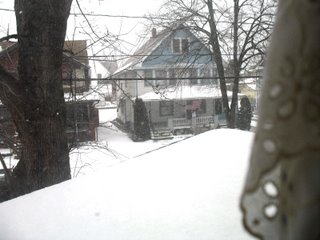interim

I've finished the cuts--altogether I cut 103 pp., which is not bad. I was surprised how easy it was after I got a rhythm. I found that my dialogue (which I've always thought of as something I do well) to be particularly cuttable--sometimes I took out a whole chunk of a conversation; sometimes I just nipped and pared until it was shaved down to something more pointed and readable. I'm a lover of he said, she said dialogue tags, but I took out some of those, too, as seemed wise.
The most cuttable thing about my dialogue was that I often had a character say a small paragraph of dialogue, with a bit of narrative interspersed, or maybe just separated by a dialogue tag. I like that kind of interruption, because I think it gives the feeling of a pause, or of real time in a conversation. But often, parts of these dialogue constructions were fat with unnecessary words--repetitive, not in the sense of saying the same words, but repetitive in linguistic content, as when someone says "John, close the window. I'm cold." In this sentence, "close the window" and "I'm cold" mean the same thing: they mean John, I want you to do something for me, and therefore, one of them can be ordinarily dispensed with (I say ordinarily, because sometimes there are good reasons for repeated linguistic content).
Some of the cutting, of course, is just plain cutting, nothing linguistic about it. If you're interested, you can read on and compare the cut and uncut beginning of chapter 25 (I cut about 70 words out of 290).
Original version:
“Now where did you say you’re going?” Granny Plain asked Jason.
He’d stopped by to mow the lawn in front of the barn and possibly get some cookies—a quick in-and-out. But his grandmother wanted to chat. She’d pinned him to the table with a glass of her special sweet tea and a plate of chocolate chip.
“It used to be a prison,” he said. “Out past Somerset.”
“I seem to remember that,” she said. The cat was on her lap, peering at Smokey, who was feigning indifference across the room. “Some of the Graves boys went there on a drug offense back in the ‘80s. Isn’t it empty now?”
“That’s the whole point,” Jason said. “It’s totally empty. Abandoned. No one’s used it for years, just kids coming in and hanging out, probably.” He wished he’d known about it when he was in high school—what could be cooler than doing a sixpack in an old prison? “It’s bound to have some paranormal energy built up.”
“No one got the chair there,” Granny Plain said, “if that’s what you’re thinking. It was strictly for drugs and small-time stuff.”
“Just because they weren’t doing the death penalty thing doesn’t mean no one ever died there,” Jason said. “I bet there were some cover-ups. Beatings. Or stabbings.”
“With a shiv?” Granny asked. She was a big fan of TV crime shows and old prison movies.
“With whatever,” Jason said. “So I’m going to go and get it on film, and we’ll see. Daytime first, and then maybe some night footage.”
“You’re not going by yourself, are you?” his grandmother asked. “I don’t like to think about you out there alone.”
“Smokey’s coming,” Jason said, and Smokey barked as if to affirm this.
Cut version:
Jason had stopped by to mow his grandmother’s lawn—a quick in-and-out. But his grandmother wanted to chat. She’d pinned him to the table with a glass of her special sweet tea and a plate of chocolate chip.
“Do you remember that prison? he said. “Out past Somerset.”
“Some of the Graves boys went there on a drug offense back in the ‘80s,” she said. The cat was on her lap, peering at Smokey. “Isn’t it empty now?”
“It’s totally empty,” Jason said. “No one’s used it for years, just kids coming in and hanging out, probably.” He wished he’d known about it when he was in high school—what could be cooler than doing a sixpack in an old prison? “It’s bound to have some paranormal energy built up.”
“No one got the chair there,” Granny Plain said, “if that’s what you’re thinking. It was strictly for drugs and small-time stuff.”
“That doesn’t mean no one ever died there,” Jason said. “I bet there were some cover-ups. Beatings. Or stabbings.”
“With a shiv?” Granny asked. She was a big fan of TV crime shows and old prison movies.
“With whatever,” Jason said. “So I’m going to go in and get it on film, and we’ll see.”
“You’re not going by yourself, are you?” his grandmother asked. “Smokey’s coming,” Jason said, and Smokey barked as if to affirm this.




